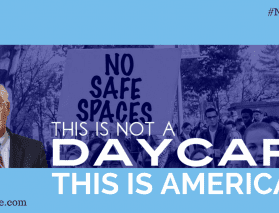One of many thoughtful responses to my recent post 5 Things I Don’t Understand about Christians Who Voted for Obama caught my attention. It expressed a thought that I saw reflected in other responses, though not with such clarity. It was this:
“My theology does not determine my politics.” I couldn’t disagree more.
Tell that to the 9/11 hijackers. Tell that to William Wilberforce. Or to Martin Luther King, Jr. Or to Jesus, Paul, David, or countless other Biblical figures.
Let’s say what we mean
Words have meaning. So let’s start there. Often we seem to disagree about ideas when, in fact, we’re just not clear on our words. Maybe we can find common ground yet.
Theology, as I understand it, means a knowledge of God. In other words, theology is what we believe about God. We could also say that definition includes what we don’t believe about God. What we believe about God necessarily deals with what we believe about the deeper stuff of life — where did we come from, where are we going, why are we here, what defines truth, ethics, relationships, values, etc.
Politics, again as I am defining it, is simply those decisions we make that affect others in the polis or the public sphere. We sometimes refer to it as “public life” to differentiate from things that seem more private in nature. But politics is simply how what we as individuals think about issues that affect others in our society and how we act on those issues. See my post Why All Christians Should Care about Politics.
So when I say that my theology most definitely determines my politics I mean that what I believe about the nature of reality, including at the core, what I believe about the Divine, necessarily determines how I act when it comes to issues that affect my neighbor.
Do we want disconnected voters?
I dont see how we could ever want someone to vote otherwise. What would that look like? Someone saying that they strongly believe one thing about the nature of the universe and what is best for their neighbor, yet walking into the voting booth and blindly pulling levers or tapping buttons that have no connection to what they think to be right for themselves and their neighbors? I fail to see how that could be a good thing.
I think that everyone votes based on their theology, that is on what they believe about the nature of God, reality, and the way the universe is supposed to work, because they cannot do otherwise. Nor would we want them to do so.
But then even saying that someone should or should not do anything requires an appeal to an authority higher than ourselves — and we’re right back to where the Divine fits into the nature of truth, what we value as important, and why one option is better than another based on an appeal to some higher standard of good.
My commentator friend — and many self-labeled progressive evangelicals — do, in fact, derive their approach to politics from their theology. We just disagree about what we believe about theology, the nature of God’s revelation to us, and the extent of our fall from that state of holiness in which He created us.
What I believe determines what I do
My politics are determined by what I believe to be true about God, just as, I hope, all of my life is. What I believe about God compels me to stop when I see a driver in distress, or to give generously to help those in need, or to correct my children when they try to poke one another in the eye (or should I be more tolerant there?). And to try to vote to best defend life as being created in the image of God. And, yes, to work to impact culture so that every child will always be wanted and loved.
Judging from comments, I guess I do need to state the obvious: the Kingdom of God does not come in the hearts of people through political force. I know very, very few conservative evangelicals who believe such a thing. But that doesn’t mean our theology can be divorced from our compassion for our neighbors in the public sphere.
That’s not to say that some voting issues are not complex or unclear or that there are any perfect candidates. But I think it would help if we were intellectually honest enough to admit that our theology does, in fact, determine our politics.
At least I hope so.











